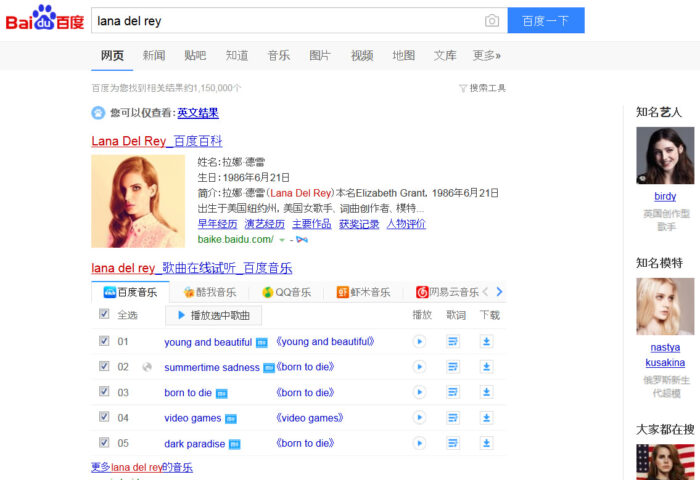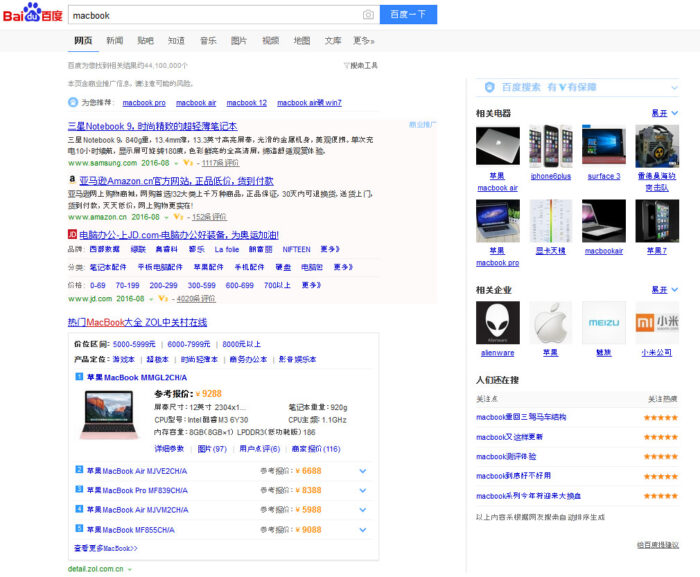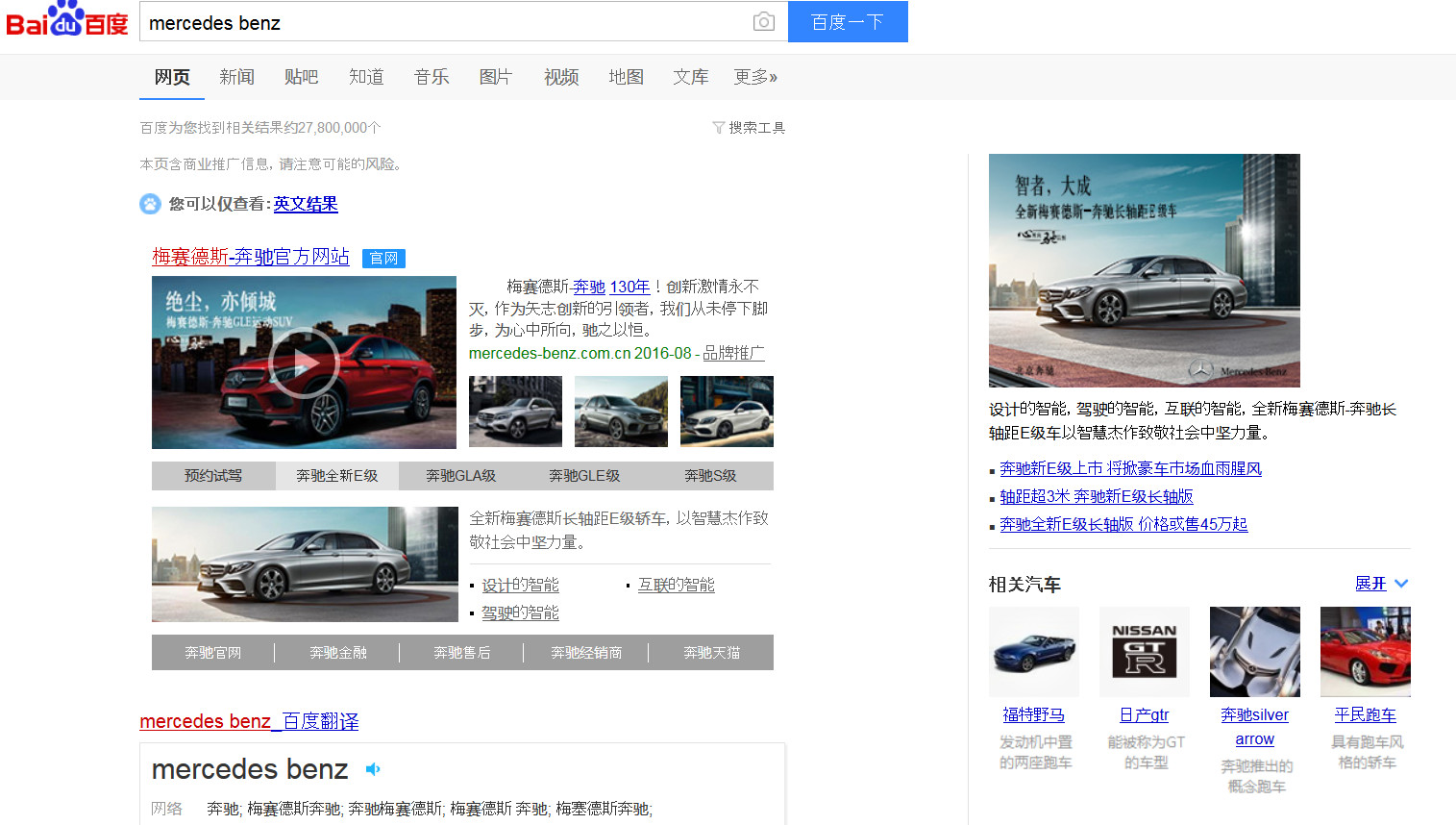Last updated on May 5, 2020
Introduction
China is an enormous market, amounting to 1.3 billion people and growing. Out of all the BRIC markets, China is the furthest in the adoption of technology and digital platforms, especially smartphones and applications.
Perhaps the most known example of Chinese digital platforms in the West is Alibaba, the ecommerce giant with market cap of over 200 $bn. Through Ali Express, Western consumers can order Chinese products – but also Western companies can use the marketplace to sell their products to Chinese consumers. However, this blog post is about Baidu, the Chinese equivalent to Google.
About Baidu
Baidu was founded in 2000, almost at the same time as Google (which was
founded in 1998). Google left China in 2010 amidst censorship issues, after which Baidu has solified its position as the most popular search engine in China.
Most likely due to their similar origins, Baidu is much like Google. The user interface and functionalities have borrowed heavily from Google, but Baidu also displays some information differently from Google. An example of Baidu’s search-engine results page (SERP) can be seen below.

Figure 1 Example of Baidu’s SERP
A lot of Chinese use Baidu to search for entertainment instead of information;
Baidu’s search results page support this behavior. In terms of search results, there is active censorship on sensitive topics, but that is not directly influencing most Western companies interested in the Chinese market. Overall, to influence Chinese consumers, it is crucial to have a presence on Baidu — companies not visible on Baidu might not be considered by the Chinese Internet users as esteemed brands at all.
Facts about Baidu
I have collected here some interesting facts about Baidu:
- Baidu is the fourth most visited website in the world (Global Rank: 4), and number one in China [1]
- Over 6 billion daily searches [2]
- 657 million monthly mobile users (December 2015) [3]
- 95.9% of the Baidu visits were from mainland China. [4]
- Baidu’s share of the global search-engine market is 7.52% [5]
- Baidu offers over 100 services, including discussion forums, wiki (Baidu Baike), map service and social network [6]
- Most searched themes are film & TV, commodity supply & demand, education, game and travel [7]
The proliferation of Internet users has tremendously influenced Baidu’s usage, as can be seen from the statistics.
How to do digital marketing in Baidu?
Baidu enables three type of digital marketing: 1) search-engine optimization (SEO), 2) search-engine advertising (PPC), and 3) display advertising. Let’s look at these choices.
First, Baidu has a habit of favoring its numerous own properties (such as Baidu News, Zhidao, etc.) over other organic results. Even up to 80% of the first page results is filled by Baidu’s own domains, so search-engine optimization in Baidu is challenging. Second, Baidu has a similar network to GDN (Google Display Network). It includes some 600k+ websites. As always, display networks need to be filtered for ad fraud by using whitelisting and blacklisting techniques. After doing that, display advertising is recommended as an additional tactic to boost search advertising performance.
Indeed, the best way to reach Baidu users is search advertising. The performance of PPC usually exceeds other forms of digital marketing, because ads are shown to the right people at the right time. Advertising in Baidu is a common practice, and Baidu has more than 600,000 registered advertisers. Currently advertiser are especially focusing on mobile users, where Baidu’s market share is up to 90% and where usage is growing the fastest [8].
How does Baidu advertising work?
For an advertiser, Baidu offers similar functionalities than Google. Search-engine advertising, often called PPC (pay-per-click), is possible in Baidu. In this form of advertising, advertisers bid on keywords that represent users’ search queries. When a user makes a particular serch, they are shown text ads from the companies with winning bids. Companies are charged when their ad is clicked.
The following picture shows how ads are displayed on Baidu’s search results page.

Figure 2 Ads on Baidu
As you can see, ads are shown on top of the search results. Organic search results are placed after ads on the main column. On the right column, there is extra “rich” information, much like on Google. The text ads on Baidu’s SERP look like this:

Figure 3 Text ads on Baidu
The ad headlines can have up to 20 Chinese characters or 40 English characters, and the description text up to 100 Chinese characters or 200 English characters. There is also possibility to use video and images in a prominent way. Below is an example of Mercedez Benz’s presence in Baidu search results.

Figure 4 Example of brands presence on Baidu
It can be easily understood that using such formats is highly recommendable for brand advertisers.
How to access Baidu advertising?
Baidu’s search advertising platform is called Phoenix Nest (百度推广). The tools to access accounts include Web interface and Baidu PPC Editor (百度推广助手).
To start Baidu advertising, you will need to create an account. For that, you need to have a Chinese-language website, as well as send Baidu a digital copy business registration certificate issued in your local country. You also need to make a deposit of 6500 yuans, of which 1500 is held by Baidu as a setup fee and the rest is credited to your advertising account. The opening process for Baidu PPC account may take up to two weeks. Depending on your business, you might also need to apply for Chinese ICP license and host the website in mainland China.
Alternatives for Baidu
There are other search providers in China, such as 360 Search and Sogou but with its ~60% market share in search and ~50% of overall online advertising revenue in China, Baidu is the leading player. Additionally, Baidu is likely to remain on top in the near future to its considerable investments on machine learning and artificial intelligence in the fields of image and voice recognition. Currently, some 90% of Chinese Internet users are using Baidu [9]. For a marketer interested in doing digital marketing in China, Baidu should definitely be included in the channel mix.
Other prominent digital marketing channels include Weibo, WeChat, Qihoo 360, and Sogou. For selling consumer products, the best platforms are Taobao and Tmall – many Chinese may skip search engines and directly go to these platforms for their shopping needs. As usually, companies are advised to leverage the power of superplatforms in their marketing and business operations.
Sources
[1] Alexa Siteinfo: Baidu <http://www.alexa.com/siteinfo/baidu.com>
[2] Nine reasons to use Baidu <http://richwaytech.ca/9-reasons-use-baidu-for-sem-china/>
[3] Baidu Fiscal Year 2015 <http://www.prnewswire.com/news-releases/baidu-announces-fourth-quarter-and-fiscal-year-2015-results-300226534.html>
[4] Is Baidu Advertising a Good Way to Reach Chinese Speakers Living in Western Countries? <https://www.nanjingmarketinggroup.com/blog/how-much-baidu-traffic-there-outside-china>
[5] 50+ Amazing Baidu statistics and facts <http://expandedramblings.com/index.php/baidu-stats/>
[6] 10 facts to understand Baidu <http://seoagencychina.com/10-facts-to-understand-the-top-search-engine-baidu/>
[7] What content did Chinese search most in 2013 <https://www.chinainternetwatch.com/6802/what-content-did-chinese-search-most-2013/#ixzz4G59YyMRG>
[8] Baidu controls 91% mobile search market in China <http://www.scmp.com/tech/apps-gaming/article/1854981/baidu-controls-91pc-mobile-search-market-china-smaller-firms>
[9] Baidu Paid Search <http://is.baidu.com/paidsearch.html>
